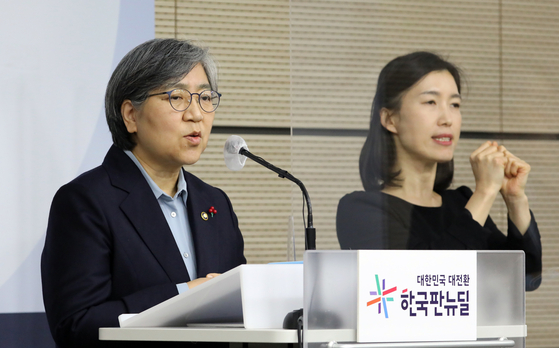
Korea Centers for Disease Control and Prevention (KCDC) chief Jung Eun-kyung is giving a briefing on the 2021 government work report at the briefing room of the Government Complex Sejong on the 25th. News 1
On the 26th, the Ministry of Education decided to expand attendance classes from early childhood, lower elementary school, and special schools. Last year, non-face-to-face remote classes were predominant. Although there were few cases of COVID-19 infection among students and faculty members, there were severe academic gaps and learning deficits. The burden of caring for parents also increased. Not only this. Children don’t have a partner next to them. I don’t even know 5 of my classmates’ names. I am concerned about social development.
Three days ago, Prime Minister Jeong Sye-gyun made a speech at the Central Disaster and Safety Countermeasures Headquarters meeting, saying, “This year should be a little different.”

Thesis by Commissioner Eun-kyung Jeong. Photo online capture
Increased expectations for school classes
Ahead of the new semester, parents’ interest was focused on whether to attend school. In the meantime, a dissertation amplified the expectations for the class. “Only about 2% of children and adolescents with coronavirus infections are infected through schools, and they lose more than the profits from school closures.” This paper was published in the Journal of the Korean Society of Child Infectious Diseases jointly with the research team of the Department of Social Medicine, Hallym University School of Medicine, on December 27, last year, President of the Korea Centers for Disease Control and Prevention.
The Ministry of Education’s movement also began in earnest afterwards. Of course, some voices were concerned about the possibility of a’group outbreak’ within the medical community. Naturally, the controversy about the opening of school reignited after the thesis was published. Chung, who was silent, explained, “There is a misunderstanding (in the interpretation of the thesis result).”

On the morning of the morning of the 26th, Yu Eun-hye, Vice Prime Minister of Social Affairs and Minister of Education, announces the work plan of the Ministry of Education for 2021 at the Sejong Government Complex. yunhap news
“No simple comparison with the third fashion”
In a briefing on ‘2021 government work plan announcement’ on the previous day (25th), Commissioner Chung said, “This paper analyzed the impact of resuming school in May-July last year, when the outbreak of local communities was not large. It means that it is important that the quarantine measures are well prepared in advance so that large-scale transmission has not occurred.”
The intention is that it should not be compared with the current 3rd pandemic situation. But the thesis added weight to the class. He said the benefits of closing schools are limited. However, one day after Chung explained, the Ministry of Education announced the expansion of classes to school. It is confusing to put a series of situations in one line. This is because the thesis (turning class to school) → Commissioner Jeong (misunderstanding) → Ministry of Education (expanding school class).

A view of the main gate of a high school converted to remote classes. News 1
Key issues encountered in thesis
Rep. Hee-sook Yoon’s point of view is convincing. Rep. Yoon pointed out, “The problem is that the people in charge of quarantine’s arguments and data analysis results have come into contact with these key issues (school classes).”
It’s not just the lack of communication. The first button, sharing, is also a problem. The major thesis published so far by the Agency for Disease Control and Prevention on Corona 19 is hidden. There has been limited sharing centered on the relevant conference and journal. It is not even registered on the website of the National Institutes of Health under the Korea Centers for Disease Control and Prevention. The same is true of thesis that summarized the epidemiological investigation and quarantine process of group infection at Guro Call Center in Seoul last April. On the other hand, the Centers for Disease Control and Prevention (CDC) has a separate page for professionals. Corona 19-related papers are coming out. The disease administration explains, “The journals and so on are open source and all are open to the public.” It means that the media or experts should look for it on their own.

Commissioner Jeong Eun-kyung. yunhap news
Sang-hyuk Ma, Vice Chairman of the University Vaccine Society, said, “(Chung Chung’s thesis) is a work made with national taxes, but I don’t even plan to inform the public.” It must be transparently disclosed on the website of the Korean Disease Administration and actively shared with expert groups such as the Korean Medical Association.”
Chung is also called the quarantine president. As Congressman Yoon expressed, what would it have been like if Commissioner Jung disclosed the data analysis results in advance to seek wisdom. The public may have given more confidence in the quarantine if they had informed the basis for the decision and sought understanding for what kind of concern was it due to whether or not to expand the class. Core issues such as attending school classes are not evaluated only as’thesis’. Chief Chung is not a scholar.
Reporter Minwook Kim [email protected]
